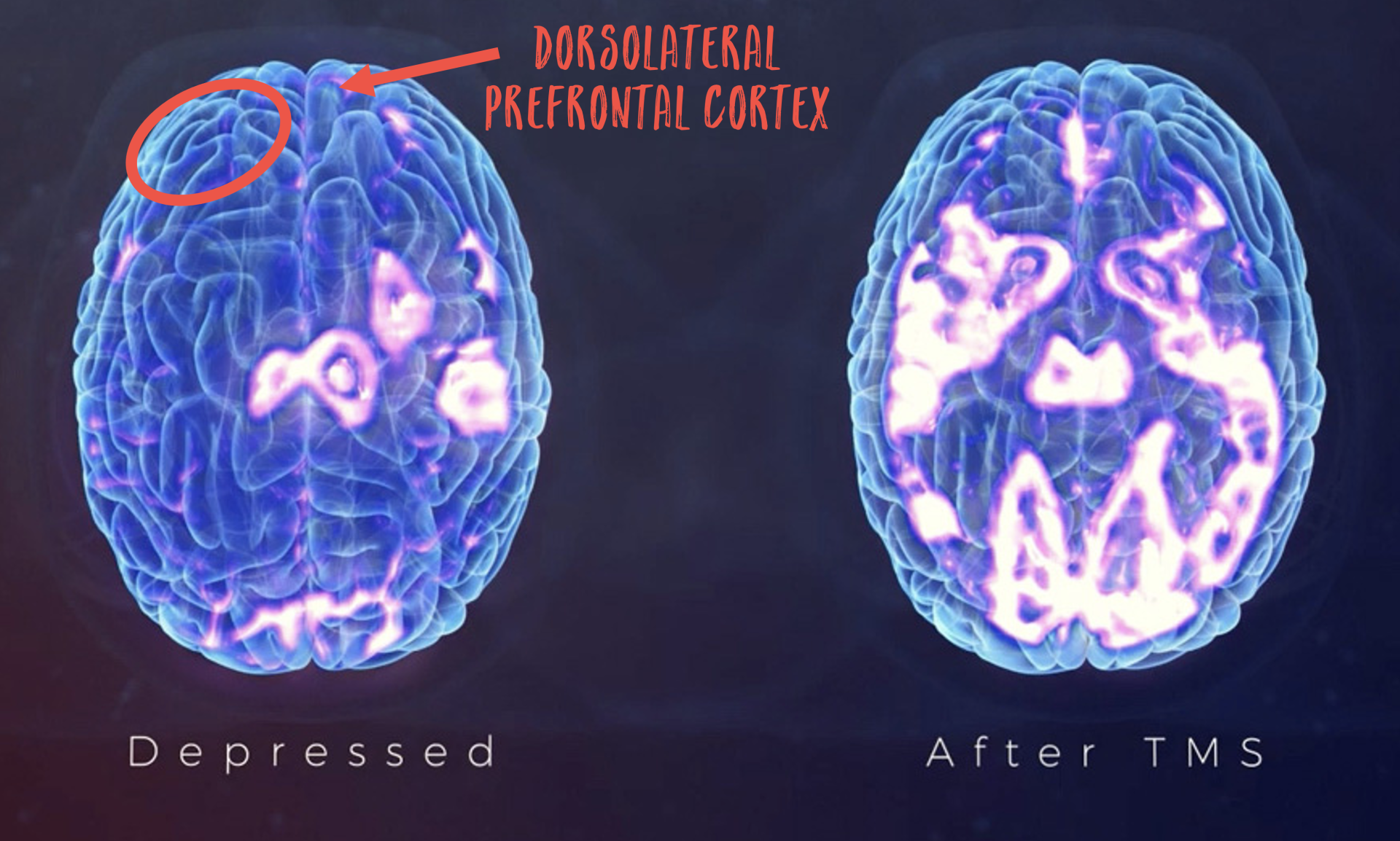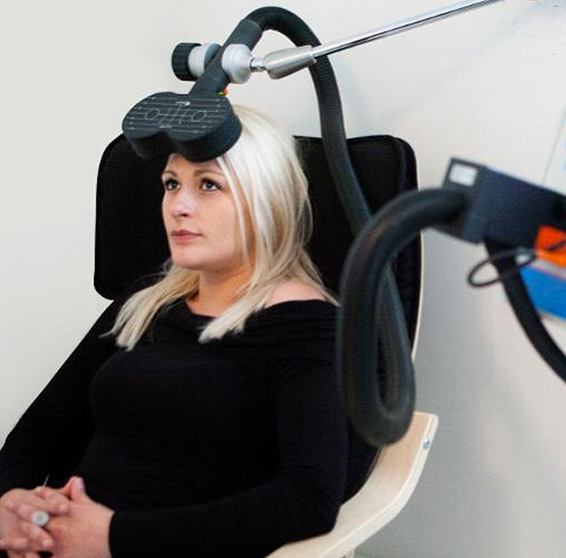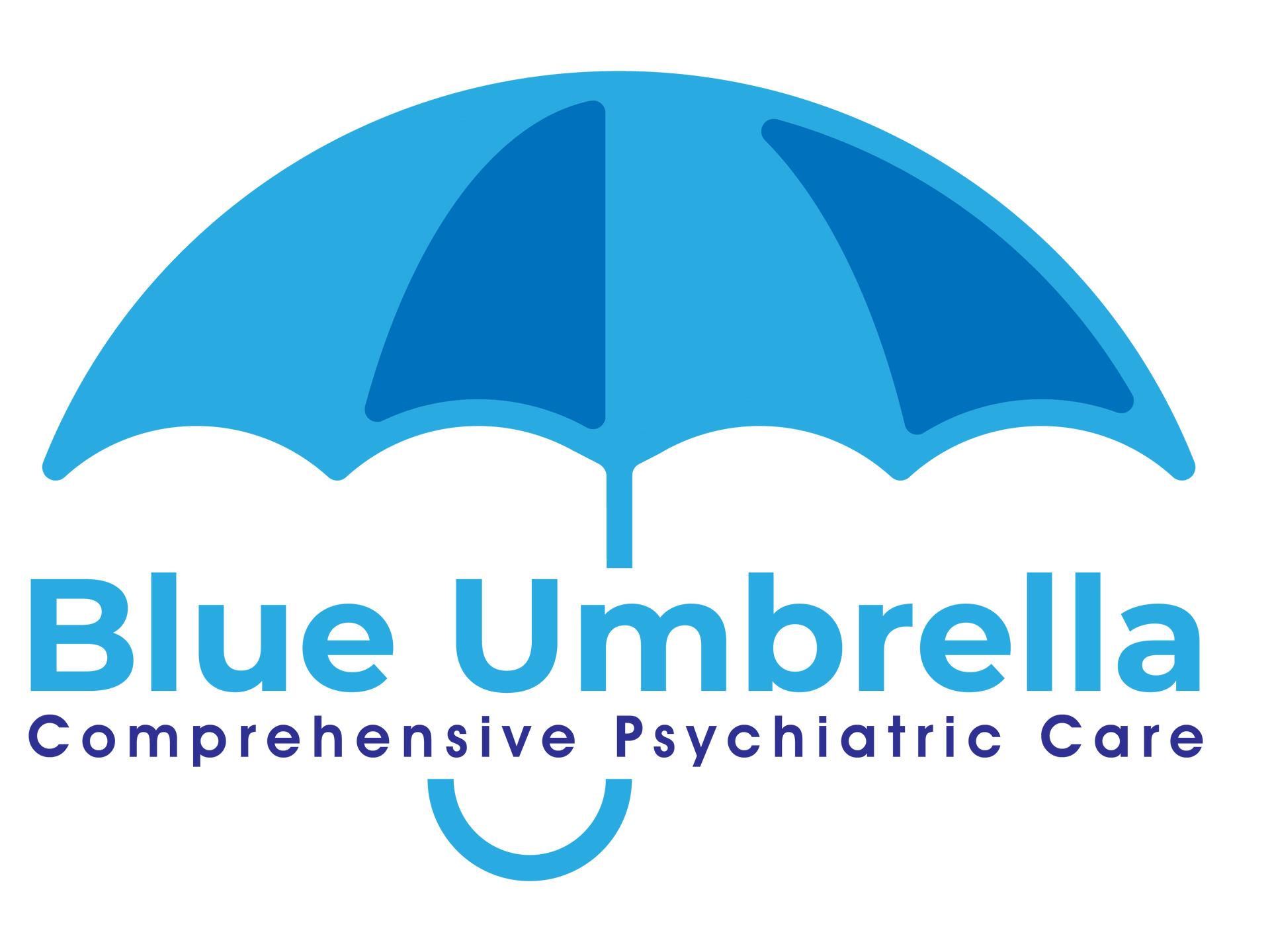Transcranial magnetic stimulation (TMS)

IT'S NOT YOU, IT'S THE BRAIN.
TMS, or transcranial magnetic stimulation, is an FDA-approved treatment that uses magnetic pulses to stimulate the root cause of depression in the brain. It's safe, highly-effective, and covered by insurance. TMS focuses on stimulating activity in the left dorsolateral prefrontal cortex, essentially the front left part of your brain. When the area is working properly, the entire brain lights up, resulting in an improved mood, working memory and selective attention.
During a TMS session, an electromagnetic coil is placed against the scalp near the forehead. This coil delivers short electromagnetic pulses.
The magnetic pulses stimulate nerve cells in the region of the brain involved in mood regulation and depression. This stimulation can affect how this part of the brain works, potentially easing depression symptoms and improving mood.
Typically, TMS treatments are administered five days a week for four to six weeks, although this can vary based on individual needs and specific protocols.
Does it work?
In our office, we've seen about 75% of patients who complete a full course of TMS show a clinically meaningful response and about 50% experience a full remission, meaning their symptoms go away completely. Sessions are about 20 minutes and you can drive to and from your appointments. The full course covered by insurance usually takes about 6-8 weeks to complete.
Overall, the high response and remission rates, along with the convenience of TMS make it a valuable option for individuals struggling with treatment-resistant depression.
TMS is a promising and effective treatment for many individuals with treatment-resistant depression. Its non-invasive nature and favorable side-effect profile make it an attractive option.

But how do you know if it's right for you?
All major payers cover TMS treatment for Depression. If you've tried multiple antidepressants and therapy, there's a good chance your insurance covers it. We know - sometimes therapy or medication alone is not enough. When depression shows no improvement after trying these methods, it’s considered Treatment Resistant Depression. Treatment-Resistant Depression occurs as high as 60% of all people with depression. Treatment-Resistant Depression is used to define a lack of success after at least two medication trials (usually different medications with various dosages) and/or at least 12 sessions of evidence-based psychotherapy.
Even when receiving high-quality care, 50% of people with depression will experience NO symptom reduction. In addition, people with TRD are twice as likely to be hospitalized. It is certainly not something to be taken lightly and additional treatment (such as TMS) should be considered promptly.

fear not
When this occurs, it is so easy to become discouraged or believe that you’re a hopeless cause. This simply is not true! Clients and therapists alike may be disheartened at the lack of progress; however, it’s not necessarily the therapist or client. The client just might need extra care in addition to therapy.
As mentioned above, TMS has remarkable success rates and is entirely safe and painless. TMS therapy is FDA approved with no long-term side effects. It is well-tolerated and does not require any kind of sedation or anesthesia. It’s also safe for any patients that are pregnant or breastfeeding.
TMS is a promising and safe treatment option for certain cases of major depressive disorder. It offers a non-invasive alternative for individuals who have not responded to traditional treatments.
frequently asked questions
-
Why should I choose Blue Umbrella Psychiatry?
If you are like many of our patients, you’ve been frustrated with previous psychiatry services and unable to find meaningful or lasting relief from symptoms that make life unpleasant. All of that is about to change.
Dr. Eric Robbins founded Blue Umbrella Psychiatry after years of working in a fragmented and uncompassionate mental healthcare industry. He noted that patients aligning with disconnected physicians and therapists led to poor communication, mixed messages, and ineffective care. Blue Umbrella Psychiatry was formed to offer all mental health services under one roof, with providers collaborating and patients caring for the whole person.
If you are looking for a psychiatry service provider who truly cares, then look no further than Blue Umbrella Psychiatry.
-
What conditions do you treat?
We treat many conditions, such as:
- Adolescent Mood Disorders
- Anxiety
- Bipolar Disorder
- Depression
- Treatment Resistant Depression
- Obsessive Compulsive Disorder
- ADHD
and more!
-
How can I contact you?
- Give us a call directly at 954-341-5215
- Email us at: office@blueumbrellapsychiatry.com
- Or fill out our convenient contact form.
-
What insurances do you accept?
We currently accept:
- Aetna
- Medicare
- Memorial Healthcare System
- Optum
- UMR
- Cigna
- United Healthcare
- Oscar
- Meritian
- Avmed
- Humana
- Evernorth
- Florida Blue
-
I don't want to be on medication. Can I still be a patient of the practice?
We understand that medications can be stigmatizing and may have potential side effects, and we respect our patients' preferences regarding their treatment. While our providers may recommend medications as part of a comprehensive treatment plan, the final decision is always up to you.
In addition to medication, we offer a range of non-medicinal treatment options to support your mental health journey, such as Transcranial Magnetic Stimulation (TMS) and various therapy modalities. Our primary goal is to help you achieve better mental health and wellbeing, and we will work closely with you to develop a personalized treatment plan that aligns with your preferences and needs.
-
What will the first appointment look like?
At the first appointment, you can expect to meet with at least one clinician who will perform a thorough evaluation. Following this assessment, a diagnosis will be provided along with a personalized treatment plan to address your specific needs.
-
To what extent are parents involved in their child's care?
A family-centered approach to treatment is something we believe in at Blue Umbrella Psychiatry. Parents play a crucial part in their child's care, and the success of the situation depends on their active participation. Beginning with a first evaluation when they offer significant insights, we appreciate parents as partners. We create individualized treatment programs together and provide chances for both group and individual therapy sessions. We also give parents the information and assistance they need to support the mental health of their children. Continuous cooperation and communication make sure that parents are aware of and involved in the process. We stand out because of our dedication to family participation and our understanding of the importance of a nurturing home environment for a child's well-being.
-
What is the difference between psychiatry and therapy?
Psychiatry and therapy are two ways of addressing mental health issues, but they differ in their approach, focus, and the professionals involved. Psychiatry involves using medications and medical treatments to manage mental health conditions. Therapy, on the other hand, focuses on talking and problem-solving techniques to help individuals cope with emotional or behavioral issues. Psychiatrists are medical doctors who have completed medical school followed by years of specialized training in psychiatry. Psychiatric Nurse Practitioners and Psychiatrists can prescribe medications. Therapists include various professionals like psychologists, licensed clinical social workers, or licensed professional counselors, who have different educational backgrounds and are trained in counseling and psychotherapy techniques.
-
From what age and up do you treat?
At Blue Umbrella Psychiatry, we provide treatment for individuals from the age of 5 and above. We understand that mental health concerns can affect people of various age groups, and we are committed to addressing the needs of children, adolescents, and adults alike. Our expert team of specialists is experienced in dealing with individuals throughout all phases of development and adjusting our approaches accordingly. Whether it's assisting young children with behavioral challenges, supporting teenagers facing emotional difficulties, or providing care for adults navigating mental health issues, we strive to offer comprehensive and compassionate treatment. We want to provide effective assistance and foster well-being for people and families throughout their lifetimes, which is why we start providing services from age 5.
-
Are you a virtual or in-person practice?
We are primarily an in-person clinic with the capability to do telehealth sessions on occasion on an as-needed basis. For the initial evaluation and subsequent follow-up sessions, you will need to be present for in-person sessions. As such we suggest that you be in close enough proximity to our clinic.
Therapy
Contact
Main: 954-341-5215
Fax: 954-613-9047
Email: office@blueumbrellapsychiatry.com
10400 Griffin Road, Suite 101
Cooper City, FL 33328
All Rights Reserved | Blue Umbrella Psychiatry



